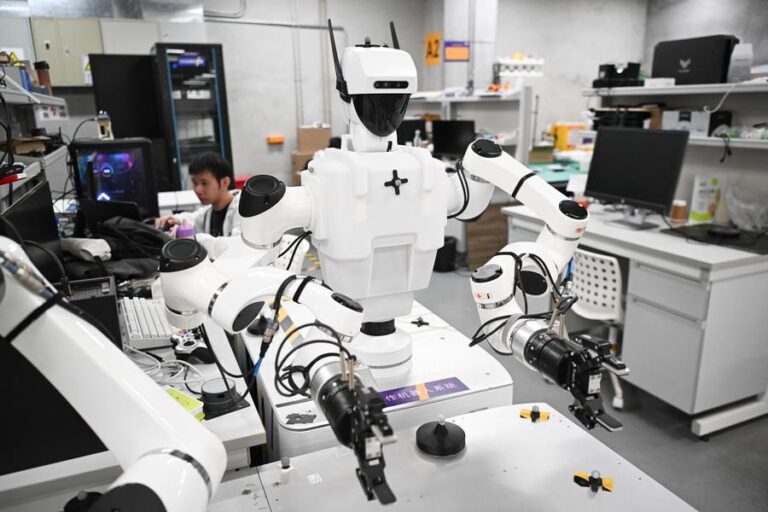by Xinhua writer He Yuzhe
BEIJING, Aug. 9 (Xinhua) — The boundary between reality and science fiction is fading fast.
At a robotics company in Beijing, my morning began with a coffee made by a dual-arm robot. It expertly brewed the espresso, frothed the milk, and handed me a latte carefully topped with a decorative image of my choice. Coffee in hand, I stepped into an adjoining massage room, where another robot assessed my physical condition before gently placing its mechanical arm on my back to deliver a soothing massage.
Behind this and other futuristic scenes are the collaborative robots, or “cobots,” manufactured by AUBO (Beijing) Robotics Technology Co., Ltd. Unlike typical industrial robots, which generally operate within physically isolated units, cobots work directly alongside their human colleagues. In the commercial cobot sector, Denmark’s Universal Robots is widely recognized as a pioneering leader.
Founded in 2015, AUBO Robotics is at the forefront of China’s cobot industry, ranking first domestically and second globally in cobot sales for years. “Last year, our collaborative robot sales surpassed 1 billion yuan (about 139 million U.S. dollars), capturing over 36 percent of the domestic market,” said Han Yongguang, chairman of the intelligent robot manufacturer.
The company also takes pride in its full ownership of intellectual property (IP) rights, breaking decades-long monopolies held by foreign companies in the robotics sector. These IP rights are also recognized by its some 500 partners across more than 50 countries.
Compared to typical industrial robots, cobots offer far greater versatility, making them suitable not just for factories but also retail, health care and education settings.
“Cobots substantially boost efficiency,” said Tian Hua, senior marketing manager at AUBO Robotics, speaking from the company’s headquarters near Zhongguancun in Beijing, which is often dubbed “China’s Silicon Valley.”
She cited massage businesses as an example: “Some of our business clients complained that skilled massage therapists are difficult to hire, train and retain. Cobots solve this problem with just a few button taps, performing physically demanding massage tasks tirelessly.”
The consistency of robots is another advantage. “By late afternoon, human therapists can experience fatigue, affecting their performance. Robots, on the other hand, never tire,” Tian explained.
Though hardly a Luddite, I nonetheless found myself reflecting, latte in hand, as the robot massaged my back: Are these cobots enhancing our lives, or quietly replacing us?
“In fact, it is precisely market demand that has driven the creation of these versatile robots,” noted Dr. Song Zhongkang, director of the AUBO Research Institute.
“These collaborative robots were never intended to replace people — as their very name indicates. Humans still supervise robotic operations. More importantly, customers often just want someone to chat with,” Song said, highlighting the irreplaceable value of human connection regardless of technological advancements.
Song considers cobots a revolutionary development in robotics: “Cobots are also seen as the first generation of intelligent robots.”
“Compared to traditional robots, cobots leverage and combine the strengths of both humans and machines, taking on physically demanding, repetitive and hazardous tasks,” Song said. “This allows humans to focus on lighter, more creative tasks, ultimately improving work quality.”
This calls to mind the philosopher Immanuel Kant’s distinction between means and ends: instead of reducing people to mere means for completing tasks, technological progress — such as the rise of cobots — enables humans to become the true ends, placing their well-being and creativity at the center of innovation. At AUBO Robotics, I glimpsed the answer to questions of how technology could indeed serve humanity’s greater good.
Perhaps this trend is also a microcosm of China’s — and the world’s — shift toward intelligent transformation. Machines exist not to replace humans, but to enrich human life. This principle holds true not only here in China, but also around the world.
As cobots quietly enter factories, hospitals and cafes, China’s journey toward intelligent automation has evolved beyond just enhancing efficiency. And amid this rising tide of technology, I am heartened to see human values not overshadowed, but illuminated — guiding us toward a future where technology uplifts rather than replaces, and where humanity remains the true measure of progress. ■

